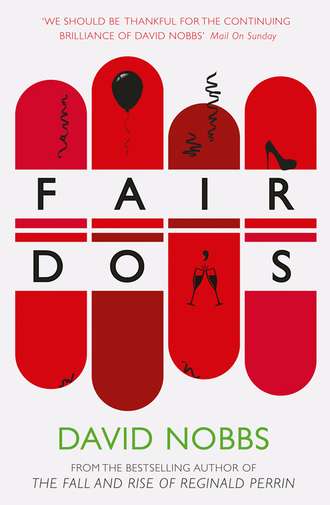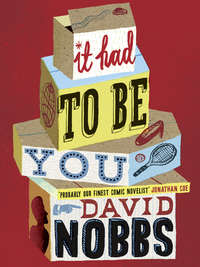
Полная версия
Fair Do’s
All those who were saddened by the turn of events wore long faces, to prove that they were saddened.
All those who weren’t saddened wore even longer faces, to hide the fact that they weren’t saddened.
Nobody looked sadder than Ted Simcock, except perhaps the photographer, the pasty-faced Wayne Oldroyd, from Marwoods of Moor Street. He cast a last baleful glance at Gerry, before shuffling off with his unused tripod.
Out of the inhospitable gravel on the south side of the church there grew a lone tree, a sickly, unshapely ash. Around this tree a munificent council had placed a round slatted seat. Onto this seat jumped Gerry Lansdown. His face was pale. His eyes were hot. His complacency was a distant memory.
‘Ladies and gentlemen,’ he cried, and silence fell instantly. Everyone wanted to hear what he would say. What could he say? ‘Ladies and gentlemen. It seems that something has delayed Rita … or something. Until we find out what … and bearing in mind that many of you have travelled a long way, many from Hindhead and some from even further afield … and as the reception … er … and it seems criminal to waste all that lovely food.’ Gerry’s voice gained assurance as he touched on political matters. ‘We in the Social Liberal Democratic party believe that all waste of food is totally unjustified in a world where so many haven’t enough to eat … so, whatever has happened, if indeed it has, I think the best course will be to proceed with the reception as if nothing had happened … I mean, as if nothing hadn’t happened. Thank you.’
Gerry jumped down off the seat, and marched firmly through the throng, which parted before him like the Red Sea before the Israelites.
Ted’s spine tingled as he realised that Gerry was about to confront him. Illogically, he flinched. But Gerry’s voice was mild, almost pleading.
‘You know Rita better than any man on earth, Ted. Why has she done this to me?’
‘Look on the bright side,’ said Ted encouragingly. ‘She could have had an accident.’
‘What?’
‘I mean, not that I … just a minor accident. I heard a siren.’
‘I’ve checked. There’s been no accident. That was an officer going home for his lunch.’ The public figure in Gerry rose to the surface even at this moment of private grief. ‘I shall write a strong letter of protest.’ Then the private anguish returned. ‘She’s jilted me, Ted.’
The guests, drifting past towards their cars, tried to ignore them.
‘What can I say, Gerry, except …’ Ted fought to keep the tell-tale gleam out of his eyes ‘… I’m very, very sorry. I mean, I am. I’m shattered. Devastated. Goodbye, Gerry.’
He held out his hand.
‘There’s no need to go now,’ said Gerry, spurning the proffered extremity. ‘You may as well come to the reception.’
‘You what?’
‘We’re colleagues now. Members of the same exclusive club.’
In the distant, ordinary town, another siren blared urgently.
‘He’s had his lunch,’ said Ted, and immediately wished he hadn’t. ‘Exclusive club? What exclusive club?’
‘The club of men who’ve been made miserable by Rita Simcock.’
‘Ah. Well. Yes. I suppose we … but, I mean, even so, is it appropriate that I, her ex-husband, should be present at …’
The elegant yellow lady turned to smile at Ted as she passed.
‘Thank you very much, Gerry,’ said Ted.
So Ted found himself back in the Garden Room of the Clissold Lodge Hotel, where, at another wedding, he … he didn’t even want to think about it.
The Clissold Lodge was situated in large, gently rolling grounds that had once belonged to Amos Clissold, the glue tycoon, whose slogan, ‘Ee! Buy gum! Buy Clissold’s’, still occupied a prime site on the station forecourt. Now it was a country hotel on the edge of town. ‘The hotel where country meets town,’ as its brochure claimed. Its red-brick exterior was austere and forbidding. The interior was more gracious, but slightly faded. In the appropriately chintzy, over-furnished lounge, four slightly faded chintzy ladies were keeping amnesia at bay with an afternoon game of bridge.
The Garden Room was a spacious function room of pleasing Georgian proportions. Outside its French windows, the low January sun shone on a charming walled garden. Bouquets of hot-house red tulips and imported freesias studded the room. The guests were chatting animatedly. Two smiling waitresses in smart black and white outfits were dispensing non-vintage Moet. There was a splendid three-tiered cake. On the long buffet table there sat a superb Bradenham ham, a magnificent sea trout in wine jelly, a large walnut and spinach terrine spiked with green peppercorns, fleshy langoustines from Brittany, cold roasts of Scotch beef and Welsh lamb, bowls of green salad, Waldorf salad, salade niçoise, bean salad, avocado and mangetout salad, and not a tuna-fish vol-au-vent in sight. It was a perfect reception, save only, a purist might complain, for the absence of the bride.
Gerry Lansdown was doing the rounds, welcoming, smiling, urging people to eat, not that they needed urging.
‘It seems wrong to enjoy anything on such an awful occasion,’ said Liz Badger, ‘but I have to admit, this sea trout in wine jelly is absolutely delicious.’ She was wearing a black and white tunic with sweetheart neck, black skirt, and an elegant black cocktail hat.
But Neville Badger, now the only Badger in Badger, Badger, Fox and Badger, wasn’t listening.
‘I must go and say something to Gerry,’ he said.
‘Why?’
‘I’m not an unimaginative man, Liz. I can imagine how he must be feeling.’ Neville searched for the mot juste. ‘Upset. I mean, I was thinking how I’d have felt if Jane hadn’t turned up at our wedding.’
‘But not me?’ Liz’s voice was icy. The sea trout was forgotten.
‘What?’
‘You married me as well. Or had you forgotten?’
‘Of course not. How absurd!’
‘It’s just that it was Jane not turning up that you instinctively thought of, because she meant so much more to you than I do. Thank you, Neville.’
‘No, Liz! Of course not. I love you. I’m the father of your child.’ Ted sauntered past, trying not to look down at the stain on his hired trousers. ‘Hello, Ted.’ He turned back to Liz and lowered his voice. ‘Well, no, not actually the father, but … no, I mentioned my marriage to Jane, I suppose, because I was married to her for so much longer than to you.’ Liz glowered. ‘So far,’ he added hopefully. ‘Anyway, Gerry needs support and it’s up to me to give it.’
‘Why you?’
Neville stared at Liz in astonishment, as if the answer were self-evident.
‘Because I’m a man of the world. An experienced professional man. A man whose working life brings him into daily contact with sorrow and distress. A man who knows what to say.’
‘What are you going to say?’
‘I don’t know. Oh Lord.’
Neville wandered off, to prepare himself for his errand of mercy. Left alone, Liz flashed a dazzling smile at the world, reducing the dazzle level sharply when she realised that she was smiling at Ted.
Ted approached his ex-lover cautiously.
‘Marvellous spread,’ he said.
‘Paid for by him, I should imagine. And rather more generously than the one poor Laurence laid on for Jenny’s wedding. Not a tuna fish vol-au-vent in sight.’
‘Odd, isn’t it?’
‘I think it’s very sensible. I hated those tuna fish vol-au-vents.’
‘I meant …’ Ted lowered his voice and looked quickly round the room, hoping most people weren’t looking at them, hoping the woman in yellow was looking at them. ‘I meant you and me, here, in this very room, where, less than two years ago, in this very room, we … went upstairs to the very room above this very room and … made love.’
‘I had remembered.’
Liz looked up at the ceiling, then at Ted, and shook her head ever so slightly at the memory of what she had done.
‘How is my baby?’ whispered Ted.
‘Flourishing. I wish you wouldn’t talk about him, Ted.’
‘I care about him. Does he … er … still takes after me, does he?’
‘No. He’s losing the resemblance rapidly. Which, I would say, shows a remarkable degree of tact for an eight-month-old baby.’
Liz walked away. Ted went to the buffet table, seeking a displacement activity. He grabbed the first bit of food that didn’t need cutlery – it was a slice of leek and stilton quiche, as it chanced – rammed a great piece into his mouth, and chewed slowly while he tried to regain his composure. He looked up to find the attractive yellow lady at his side smiling radiantly. He chewed desperately, tried to swallow, chewed again, tried to smile, chewed, and mumbled, ‘Hello. I’m Ted Simcock,’ through a porridge of half-chewed quiche.
‘Of course you are,’ said the symphony in yellow.
‘You what?’
‘I’ve had my card marked.’
At last the quiche was gone, and he could speak freely. He failed to take full advantage. ‘What?’ he said.
‘You’re opening a new restaurant in Arbitration Road.’
‘What?’ Really he might as well take another mouthful, if he couldn’t do better than this.
‘I’ve made it my business to find out about you.’
Her voice was cool, but not cold. It was classy without being shrill. He liked it. He liked her. He tried to think of something interesting to say. He said, ‘Good heavens.’
‘You interest me.’
‘Good Lord.’
There was a loud crash of plates.
‘Good God.’
It couldn’t be.’
He turned slowly, towards the kitchen door.
It was.
It was Sandra. Sandra, whom he’d met at the DHSS. Sandra, whom he had found a job at Chez Albert. Sandra, with whom he lived.
‘Oh no,’ he said. ‘Oh heck.’
As she bent down to pick up the broken plates, the cake-loving Sandra Pickersgill flashed Ted a look of defiance. The left leg of her tights had snagged.
Gerry Lansdown, hoping that the dreadfulness of his predicament would disappear if he ignored it, was holding a determinedly casual conversation with his best man and his best man’s wife. They had exhausted the charms of Dundee and its environs, the state of the jam industry, the rope industry, and the royal burghs of Fife, and had turned to his native Surrey, far from this hard North Country into which he had strayed with such disastrous results.
‘I love that whole area,’ he was saying. ‘Farnham. Guildford. The Hog’s Back.’
Neville approached, concern creasing his bland face.
‘I’m not interrupting, am I?’ he said.
‘No. No.’ Gerry excused himself reluctantly from the enjoyable geographical chit-chat.
‘Only, I … er … I felt I had to come and talk to you. You see, Gerry …’ Neville became portentous, ‘I’ve been there.’
Gerry was puzzled. ‘Been there? Been where? Guildford?’
‘Guildford?’ It was Neville’s turn to be puzzled.
‘We were just talking about Guildford,’ said Gerry.
‘Oh! Oh, no. No, no, no, no.’ Neville felt that these repeated negatives might be construed as an unworthy slur on a fine town. ‘I mean, I have been to Guildford, but no, I … nice town, specially the old part. No, I meant, I too have … Jane and I went to the theatre, with friends … no, I … er … and a little Chinese restaurant, nice crunchy duck, funny how these things stick in the … no, I meant, I too have been through great sorrow. I too have visited the pit of despair. I know how you’re feeling.’
‘Ah.’
‘Dreadful.’
‘What?’
‘You’re feeling dreadful.’
Gerry’s lips twitched. ‘Fancy you sensing that,’ he said. ‘How shrewd.’
Neville was oblivious of Gerry’s anger. ‘I want to promise you,’ he persisted, earnest concern etched on his rather tired face, ‘not as a cliché, because it can be a cliché. You’ll get over this, Gerry. Time is a great healer.’
Gerry smiled faintly, and spoke very quietly, so that it was a while before Neville realised that he had actually said, ‘Why don’t you stuff a sea trout in your gob and drown yourself in wine jelly?’
Sandra came in from the kitchens bearing, somewhat precariously, a magnificent sea trout on a large Royal Doulton plate. Her expression matched that of the fish. She looked not to left nor to right. Guests made way for her. She plonked the fish on the buffet table, behind the wrecked carcass of its fellow.
Ted had been standing by the locked French windows, looking out on the paths and patios of the walled garden. The shadow of a cloud cast a brief winter gloom over the bare, pruned roses, the empty urns, the ornamental pond where silver carp lived out their monotonous lives. What a lot had happened, what monumental changes there had been, since he had sat in that garden, at Jenny and Paul’s wedding, trying to give Rita the courage to face the throng. And now … had her courage failed her, or had she shown a great degree of courage? He didn’t know. He didn’t know anything. He didn’t know what to do about Sandra and the yellow lady. He sensed Sandra’s entry with the sea trout.
He adjusted his trousers, remembered the dirty mark, shrugged, tried to look taller than he was, and sidled through the guests to the buffet, where he stood irresolutely beside his inamorata, trying hard to look as if he was interested not in her, but in the buffet; because, as far as he knew, nobody in the town knew of his affair with Sandra, except the staff at Chez Albert and, inevitably, the postman. In fact Ted had even promised Monsieur Albert, the eponymous owner of Chez Albert, that he had ended the association, since Monsieur Albert – who hailed from Gateshead – was installing Ted as manager in a sister restaurant, and thought Sandra insufficiently classy to be the bedfellow of one of his managers.
‘Sandra! What are you doing here?’ hissed Ted.
Sandra turned her hurt, pert face on him. ‘They phoned just after you left. They’d been let down. I held out for double overtime. I thought you’d be chuffed.’
‘Well, yes, very nice, Sandra, more than useful, we can put it towards those curtains, I’m dead chuffed. But.’
‘I know,’ said Sandra, ‘but I never dreamt you’d be here.’
‘No, well …’ The Sillitoes drifted past. They smiled at Ted. He changed his tune rapidly. ‘Could I have a sliver of salmon, please, waitress?’ The Sillitoes had passed out of earshot. ‘I didn’t know either, Sandra.’
‘You’re ashamed of me,’ said Sandra flatly. ‘You don’t want anyone to see you talking to me. And it’s sea trout, anyroad.’
They began to move along the buffet table. Sandra put dollops of the various salads on Ted’s plate as they talked.
‘Rubbish,’ said Ted. ‘It’s rubbish, is that, Sandra. I don’t want anyone to see you talking to me.’
‘You what?’
‘In case you get sacked and lose your double overtime.’ Liz was approaching. ‘I’ll have a bit of the salad niçoise, as we in the catering industry call it.’
Sandra put a sizeable dollop of salad on Ted’s plate. A piece of anchovy slid onto the carpet unnoticed.
‘So!’ she said, when Liz had gone. ‘A sensational development.’
‘Sensational!’ said Ted with relish, forgetting that he was supposed not to be pleased.
‘And you’re pleased.’
‘I am pleased. I admit it. But only because he’s not right for her, not because I … Rita and I are over, Sandra.’
‘I know.’
‘Honestly, love! We are! Over. Finito. You what?’
‘I know. I’ve seen how you talk to that tarty piece.’
‘Sandra! She is not a tarty piece.’ Ted realised his mistake. ‘And I’ve no idea who you’re talking about.’
‘So!’ A scoop of potato salad. ‘You’re smitten!’ A scoop of Waldorf Salad. A couple passed close by. ‘Bean salad, sir?’ said Sandra, playing Ted’s game scornfully.
‘Thank you, Sandra.’
The couple threw hostile glances at Ted. He recognised Rita’s sneezing uncle and his wife. Her hat matched his nose. They moved on without speaking. It was a deliberate snub, for what Ted had done to Rita.
‘I am not, Sandra,’ he said. ‘I am not smitten. But I like to get my facts right. And the lady to whom I assume you refer, with whom I had a brief sophisticated exchange of views on Beaujolais Nouveau, happens not to be a tarty piece. All right?’
‘“Beaujolais Nouveau”! The only Nouveau you’ve ever drunk is Theakston’s Nouveau. She’s a tarty piece and you’re besotted.’ Ted began to raise his voice, forgetting that he was supposed to be having a casual conversation with a waitress who happened to be a colleague.
‘She’s a classy, elegant, attractive woman and I am not besotted.’
For a moment they glared at each other, eyeball to eyeball. Ted, expecting a deadly insult, was surprised to hear Sandra say, ‘Mayonnaise, sir?’ He was even more surprised to see the huge scoopful of mayonnaise that she plonked onto his absurdly heaped plate. It dropped off the edges. There would be a yellow stain just beneath the pale stain on his trousers. He turned away, trying not to show his anger.
The Sillitoes sailed unsuspectingly towards him and met the full force of the gale.
‘Hungry?’ said Rodney, seeing Ted’s piled plate.
‘Get stuffed,’ said Ted, as he stomped off.
‘What did I say?’ said Rodney.
Betty indicated Sandra with her head.
‘Ah!’ Rodney nodded, as if he understood, then realised that he didn’t understand. ‘What?’
He found himself staring into Sandra’s disconcertingly knowing young eyes and turned away. Now the Sillitoes were on collision course with Neville and Liz.
‘Ah!’ said Neville. ‘The Sillitoes! Calmer waters!’
‘What?’ said Rodney. ‘Well, who’d have thought Rita’d ever do a thing like that?’
‘Will we ever understand the minds of …?’ Neville hesitated, ‘… people?’
‘You were going to say the minds of women, and then thought I’d accuse you of being sexist,’ said Liz.
‘What an awful thing for Rita to do, though,’ said Betty Sillitoe, over-explicit as usual.
‘Yes,’ said Liz. ‘How to upstage everybody by not being present.’
‘That wasn’t what I meant,’ said Betty.
‘So, what are you two planning now that your chickens will never come home to roost again?’ enquired Neville.
Rodney Sillitoe, who still looked as though he had spent the night in a chicken coop in his suit, even though he was no longer the big wheel behind Cock-A-Doodle Chickens, having let all his battery chickens go free in a fit of remorse, explained their new plans briefly, but with evident enthusiasm. ‘We’re opening a health food complex.’
‘With wholefood vegetarian restaurant,’ added Betty proudly.
Liz laughed. Her laugh trilled through the tense gathering like the cry of a curlew on a misty morning.
‘Liz!’ said Neville.
‘Sorry.’ Liz seemed contrite. ‘But Mr and Mrs Frozen Drumstick selling nut cutlets!’
‘Why does everybody think vegetarian food is just funny laughable old nut cutlets?’ protested Betty.
Liz’s dainty hand fluttered to her neck, to be impaled there, a dying butterfly. ‘My God! You’re serious converts,’ she said, and laughed again, a less elegant laugh, a magpie’s malicious cackle.
‘Liz!’ said Neville.
‘Oh Lord,’ said Liz. ‘I shouldn’t laugh at anything today, should I? Sorry, Neville. Social lapse over.’
There was an uneasy pause. Neville, usually the first to fill uneasy pauses, leapt in. ‘Can I get you two a drink?’ he asked, before remembering that it wasn’t wise to offer the Sillitoes drinks.
‘Oh thank you,’ said Betty. ‘Grape juice, please.’
‘Apple juice, please,’ said Rodney.
This time Liz’s laugh was an owl’s hoot.
‘Liz!’ said Neville.
It would have been impossible for all the guests to have remained hushed all afternoon. It would have been unnatural if they had all continued to behave unnaturally all afternoon. So, as the sun dipped, as clouds bubbled up in the increasingly unstable air, as champagne flowed and sea trout slithered down throats, and an Egyptian cherry tomato with no respect for class squirted down the waistcoat of a merchant banker from Abinger Hammer, it was only natural that stories should be told, that laughter should be heard, that cautiously desirous looks should be exchanged between the head waiter at Chez Albert and the mysterious yellow lady whose blonde hair might have been natural.
By the time Simon Rodenhurst, of Trellis, Trellis, Openshaw and Finch, approached the cynical Elvis Simcock and his long-haired fiancée, Carol Fordingbridge, a casual observer could have been forgiven for thinking that it was a happy occasion.
‘Hello,’ said Simon. ‘What an extraordinary … er … what can I say? What can one say? I’m … er … I’m …’
‘This is an unprecedented moment in our island’s history, Carol,’ said Elvis. ‘An estate agent lost for words.’
‘Here we go again,’ sighed Simon. ‘It’s bash an estate agent time. It’s mock an easy target time.’
‘You could say the situation leaves considerable scope for improvement,’ said Elvis. ‘Which is estate agent-ese for a ginormous cock-up.’
‘Except it isn’t,’ said Carol, who looked charming in an apricot crêpe, short-sleeved, belted dress.
‘What?’ said Elvis.
‘You never wanted your mum to marry him.’
‘No, but … I didn’t want her to do that to him.’
‘I believe you’re starting to like him now he isn’t going to be your new father.’
‘Well … he’s quite a nice bloke.’
Carol was appalled. ‘He’s a faceless, ambitious, self-satisfied, crummy, crappy, yuppie smoothie prig,’ she said.
‘He’s quite a nice faceless, ambitious, self-satisfied, crummy, crappy, yuppie smoothie prig.’
‘Hey!’ said Simon. ‘When are you two love-birds going to name the day?’
‘Poor Simon. Thank God I’m not cursed with good manners,’ said Elvis.
‘What?’ said Simon.
‘Trying to change the subject so tactfully.’
‘Except it wasn’t tactful, was it?’ Both men were shocked by Carol’s vehemence. Vehemence wasn’t her stock-in-trade.
‘What?’ said the philosophy graduate feebly.
‘He won’t name the date, Simon, till I’ve passed my philosophy finals.’
‘What?’ said the bemused young estate agent.
‘Oh, bloody hell, stop saying “what” alternately, will yer?’ said this new vehement Carol. ‘I’ve yet to satisfy Elvis, Simon, that I’m a mentally worthy partner for his philosophic journey through life.’
‘What?’ said Elvis.
Carol stormed off, leaving one rather surprised young man and one very surprised young man.
‘Women!’ said the very surprised young man.
‘I know,’ said the rather surprised young man. ‘They have an uncomfortable habit of hitting on the truth, don’t they?’
‘Simon! That was almost clever.’
‘I know. I have the occasional flash.’
‘How is your sex life?’
‘Non-existent.’ Simon dropped his voice. ‘I’ve given it up. That married woman I showed round one of our properties was the last woman I will ever have in my life.’
‘That’s funny,’ said Elvis. ‘I had the distinct impression she was the first woman you’d ever had in your life.’
Simon’s concern for his image wrestled with his need to confess. The need to confess won.
‘She was the first woman and the last woman I’ll ever have in my life. I hate sex. It terrifies me,’ he said. ‘There! I’ve admitted it. I’m a happy man, Elvis.’
Simon’s sister Jenny was staring at the fading day, trying to fight back tears as she thought about her own wedding day, only seventeen months ago.
The sky was dotted with clouds now. Jenny watched their shadows. At her wedding, she had been real. Now she felt that she was a shadow.
These dark shapes that floated across the neat rectangles of that over-careful garden, what could they be to a young woman so sensitive to the prospect of cosmic disaster but the shadows of strange flying creatures, birds and mammals rendered enormous and grotesque by nuclear radiation on a vast scale, huge deformed multi-breasted limbless freaks with pitted scaly skins? She shuddered and turned away from the horror of it, towards the horror of the pretended normality of the Garden Room. She walked instinctively towards Elvis, her husband’s brother, and he seemed to walk equally instinctively towards her, so that what he said became curiously important to her.







